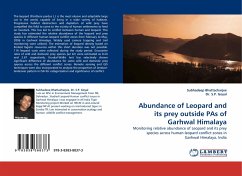Predation is one of the commonest ecologial interactions in the natural world, and predators have attracted attention from all sort of naturalists, and then scientists, since time immemorial. However, the influence of predator prey relationships on the functioning of ecosystems remains largely unclear. The theoretical and empirical studies available to date are insufficient to provide comprehensive knowledge on the ecological consequences of predation, especially as the biological complexity increases. Predator prey studies are also of much interest for the conservation of prey, and particularly of predators, mainly due to the traditional, strongly unfounded conflict between them and game harvesting. This book, with its six main chapters, aspires to increase and stimulate current knowledge of predator prey relationships worldwide. For this purpose, the author takes advantage of the in-depth exploration based on either an ecological or a conservation approach of a typical Mediterranean vertebrate system. As a result, some old, controversial questions now find novel, science-based answers.
Bitte wählen Sie Ihr Anliegen aus.
Rechnungen
Retourenschein anfordern
Bestellstatus
Storno








